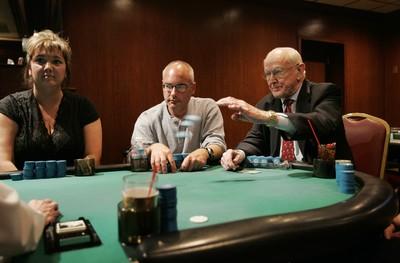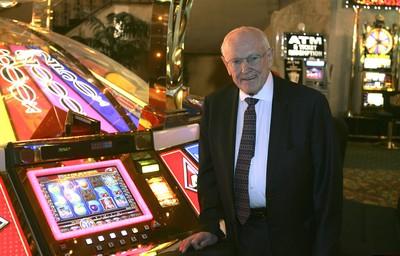FOR FOUNDER, GRIND GOES ON
The poker room at the El Cortez is really just a nook, three tables of worn green felt barely separated from slots that still clink out real quarters.
On a recent Saturday night, a motley collection of regulars, several missing teeth and some drawing from the bottom of free beers, surrounds one table as a man in a dapper suit, tie emblazoned with aces and JDG monogrammed on his shirtsleeves, approaches.
He sits down to friendly nods, and the manager comes over with 100 racked, blue $1 chips. The new player takes out a thick wad of bills -- a few $20s on the outside, plenty more $100s on the inside -- and hands over a large one.
"What you got there, Jackie?" asks one player. "Five grand?
"I'm lucky if I got $50."
Jackie Gaughan, once king of downtown, smiles, then hunches over his cards.
Contemporary of the likes of Benny Binion and Sam Boyd, Gaughan sold four of his five remaining casinos three years ago for $82 million to Barrick Gaming.
Known far and wide as simply Jackie, he is a throwback to the days before the new Las Vegas of hip night spots, high-stakes poker and corporate gaming.
On this night, like most nights, he wanders down from his apartment on the 15th floor of his El Cortez and plays in one of the lowest-limit poker games in Las Vegas outside a living room: $1 to $3 spread limit, $6 on the end.
At 86, he still walks the casino floor daily, hands out the big promotional checks to squeals of "Thanks, Jackie!" and, like all gamblers, looks for a little action.
Gaughan is one of the casino operators who shaped downtown Las Vegas, said David Schwartz, director of the Center for Gaming Research at UNLV.
"He's one of those responsible for everything about downtown, the fact that there still is a viable downtown," Schwartz said.
John D. Gaughan got into the gambling business growing up in Omaha, running horse and sports bet tickets to bars and poolrooms. After graduating from Creighton University with a degree in accounting, he served in the Army Air Corps.
While serving in Tonopah, he bought a 3 percent interest in the Boulder Club, located where Binion's now stands.
He moved to Las Vegas with his wife, Bertie, and sons, Michael and Jackie Jr., in 1951.
Jackie went on to own, operate, or have a piece of the action in casinos like the Flamingo, Showboat, Union Plaza, Golden Nugget, Las Vegas Club, Gold Spike and Western Hotel.
The El Cortez, which he bought in 1963, is the last vestige of an empire that his associates say once covered a third of downtown.
There was talk of including the El Cortez in the 2004 sale of the Plaza, Las Vegas Club, Western Hotel and Gold Spike. But the casino was Jackie's home, where he has lived for about 20 years, and the place he felt most comfortable.
"We decided we're not selling Jackie out," said Kenny Epstein, director of the El Cortez. "This is his place."
Until recently, Jackie bucked the trend of corporate casinos.
He micromanaged all the casino operations, from fixing leaky pipes to moving new slot machines into the Flamingo and getting a hernia for his trouble.
Occasionally, he would give a jump start to a customer's car.
"He's not as sophisticated, as fashionable, as some of the other guys, but he's solid," Epstein said.
Gaughan produced the first "Fun Book," which offered gamblers coupons for bonuses like a free roll of nickels and free steaks.
Jackie focused on the lower-end locals market and the budget tourists from the Midwest.
Back in Omaha, those headed to Las Vegas knew to go see Jackie. When you told him you were from Omaha, he would put you up in one of his hotels for a night, maybe even comp a pair of show tickets.
His casinos were known as "grind joints." The casino keeps a lower percentage of what customers gamble, making up for it by keeping the overhead low and packing them in.
The El Cortez is undergoing $20 million in renovations. But for some, the improvements at Jackie's properties were too long coming.
Mayor Oscar Goodman regularly jokes that he can now go in there without fear he'll catch some lung disease from the carpet.
He praised Gaughan for being "one of the founders of Las Vegas."
But Goodman admitted he was happy when most of Gaughan's properties were sold in 2004, hoping the new owner would invest more in downtown.
"I was hoping with some new blood, we would see some change," Goodman said.
Gaughan's son, Michael, who now owns the South Point casino, said his dad "could never understand why I wanted to go to the Strip. He loved downtown, he loved the El Cortez."
These days, casino owners are either corporate executives or celebrity operators like Steve Wynn and George Maloof. Neither wants to be known as a "grinder."
"It's not a label most people embrace today, but it's a good model," Schwartz said. "It is the antithesis of the Wynn model, which has not only the highest overhead, but the highest profits in town."
Wynn got his start at the Golden Nugget with the help of Jackie.
"He helped me learn the business on Fremont Street," Wynn said. "He had a real feel for local business, promotions, for running a grind store. It was old Las Vegas, with sawdust on the floors."
Wynn said Jackie has always been a man of caution and reserve. "He never had an ill feeling about anyone. If someone was a real desperado, a real low-life, he'd say, 'He's a real interesting fella.' He'd never say he was a dirty, low-life son of a bitch," Wynn said.
Jackie still goes to all the staff meetings, but is mostly quiet. Sometimes at dinner he'll ask how a customer complaint from earlier that day was handled.
Michael Gaughan said his father's physical health is fine, but not his memory.
"His memory's gone," he said.
But those around him most days dispute that.
"It's old age, a little more forgetfulness than normal," said Tony Gurovsky, Jackie's driver and the casino's director of special events. "Nothing's wrong with him."
"There's still a rivalry there," Mike Nolan, general manager of the El Cortez, said of Michael Gaughan's characterization of his father.
The day-to-day operations at the El Cortez are managed by Nolan, Epstein and John Woody, the chief financial officer.
Nolan said Jackie is chairman of the board.
"He knows everything we're doing. We discuss it with him. He just lets us do it," Nolan said.
Jackie says little in interviews, answering with short answers.
How often does he play poker?
"Every day."
Asked how he does, he said, "Not too good, but it's just for fun. I enjoy being with the customers."
Does he consider himself a legend?
He laughs, so you can take it any way you want.
Regardless, he's still generous with winks, and his customers love him.
He walks through the casino, and patrons look up from their video poker machines like they're glimpsing a figure in an old photograph come to life.
"Howya doin', Jackie!" cried Charles Rayner, a 56-year-old local with a Beck's resting on his video poker machine.
"This is the best place in Las Vegas as far as I'm concerned," Rayner said. "You always get a good deal."
Back at the poker table, Jackie followed the hands, raked in a few pots, and gave a solid "darn" when the river card came that would've made his hand.
After about an hour of play, a security guard comes over.
"Ready to go, buddy?" he asks.
Gurovsky, Jackie's driver, says Jackie marvels at what Las Vegas has become when they take trips down to the Strip.
Others marvel at Jackie, who Steve Wynn called the last of a generation.
"He's Las Vegas. This is us."


















